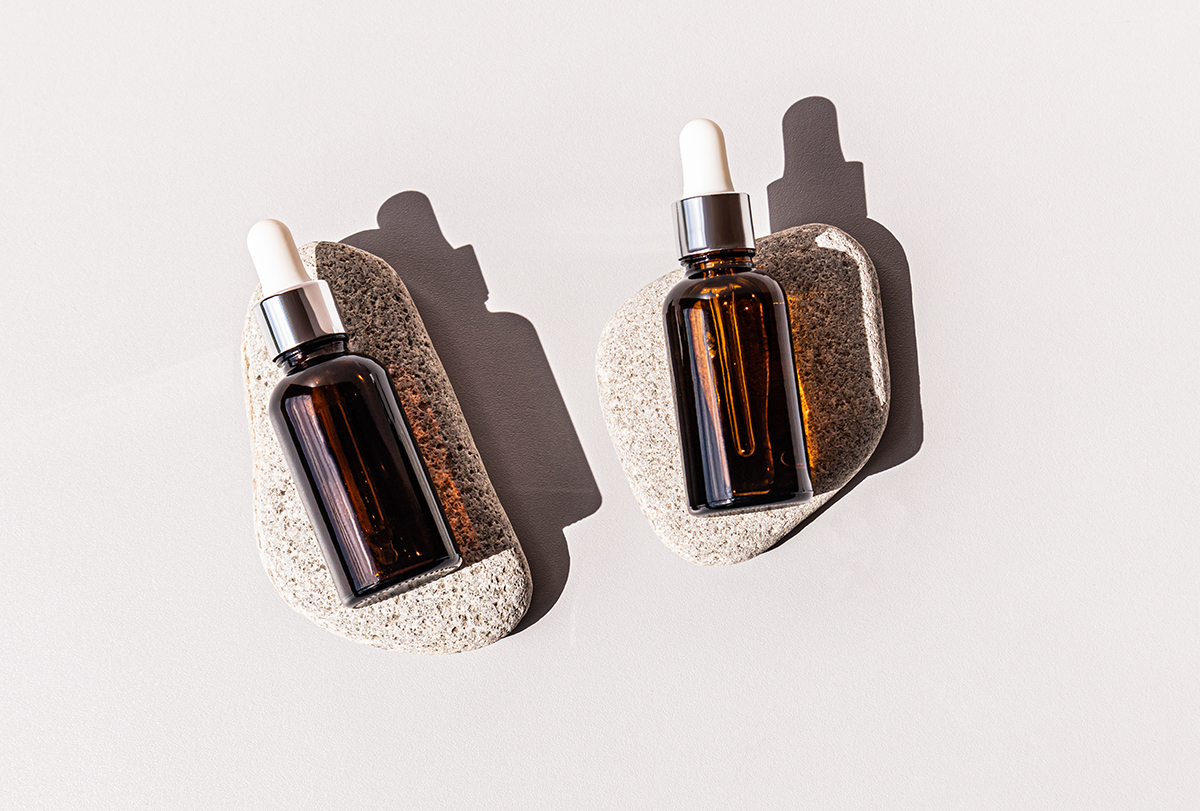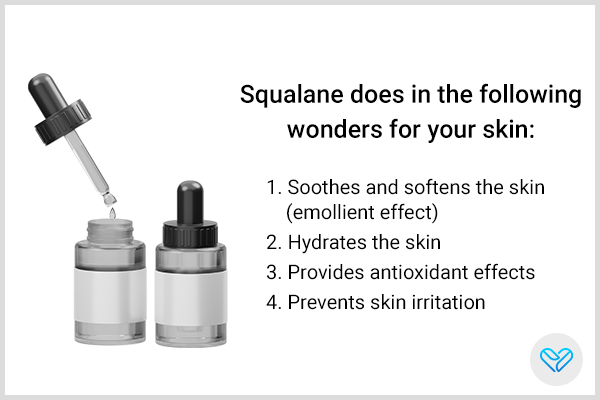In this article:
Squalane and hyaluronic acid are both popular skin care ingredients known for their hydrating properties, but they function in different ways and offer unique benefits. (1)(2)

Squalane is a lightweight, nongreasy oil that closely resembles the skin’s natural sebum. It helps to hydrate and replenish the skin’s barrier, preventing moisture loss and preserving the skin’s softness and suppleness. (1)(3)
Hyaluronic acid, on the other hand, is a powerful humectant that draws and retains water in the skin while providing antiaging effects. (2)
Thus, both squalane and hyaluronic acid can be useful for different skin types and worries.
Squalane is great for dry skin, as it rejuvenates the skin, moisturizes it, and enhances skin softness. Hyaluronic acid is suitable for all skin types and is particularly beneficial for people with very dehydrated skin seeking intense hydration and/or antiaging effects.
Read on to find out more about them and which one is the most suitable for you.
Squalane or Hyaluronic Acid: Which Is Better for You?
| Aspect | Squalane | Hyaluronic Acid |
|---|---|---|
| Source | Derived from olive oil or sugarcane (plant based) | Naturally present in the body, often derived from bacteria or plants |
| Texture | Lightweight, nongreasy oil | Gel-like substance |
| Function | Hydrates and replenishes the skin barrier | Draws and retains water in the skin |
| Skin Types | Suitable for all skin types, great for dry skin | Suitable for all skin types, especially dehydrated skin |
| Moisturization | Deeply moisturizes the skin, restores skin softness and suppleness | Provides hydration, improves skin moisture levels |
| Antiaging Effects | Does not have specific antiaging properties | Offers antiaging effects, improves skin appearance |
| Antioxidant Properties | Possesses antioxidant properties | Not known for significant antioxidant properties |
Squalane and its role in skin care
Squalane is a special compound found in the skin that plays an important role in keeping it healthy and protected.
It is a natural component of the lipids, or fats, present on the surface of your skin. You can think of it as a building block that helps maintain the skin’s structure and function.
Interestingly, squalane gets its name from its initial discovery in the liver oil of sharks, where it is found in large amounts. However, squalane is also naturally present in the human body, especially in the skin. (3)
Squalane can do the following wonders for your skin:

1. Soothes and softens the skin (emollient effect)
Squalane is a fantastic product for your skin as it functions as a moisturizer. When applied to your skin, it gets absorbed quickly and deeply, helping to restore the skin’s natural softness and flexibility.
The best part is that it doesn’t leave any greasy residue behind.
Researchers have developed new skin care products that contain squalane, using advanced scientific methods. (4)
2. Hydrates the skin
Squalane, a key component of the skin’s natural lipids, has been found to improve hydration and restore the skin’s protective barrier.
Studies have shown that incorporating squalane into skin care products can help prevent water loss and reverse the effects of certain skin conditions, resulting in better skin hydration. (3)(5)
3. Provides antioxidant effects
Squalane has been found to have antioxidant properties, meaning it can help protect the skin from damage caused by oxidative stress, such as exposure to sunlight.
Squalane is also resistant to damage itself, so it can keep working for longer on your skin. (6)(7)
4. Prevents skin irritation
Studies have shown that squalane can reduce the production of a reactive molecule called superoxide anion, which is associated with skin irritation. This indicates that squalane may play a role in alleviating skin irritation by suppressing the production of superoxide anion. (8)
Hyaluronic acid and its role in skin care
Hyaluronic acid is a compound that inherently occurs in the body and has a vital function in maintaining skin moisture. It behaves like a sponge, drawing in and holding onto water molecules, which helps maintain the skin’s hydration levels.
Hyaluronic acid is found in various tissues throughout the body, but it is most abundant in the skin, where it contributes to its structure and elasticity.
Despite its simple composition, hyaluronic acid has diverse properties due to its specific structure and can take on different shapes depending on the surrounding environment. Its presence in the skin helps in conserving its hydration and overall health. (2)
Hyaluronic acid can do the following wonders for your skin.
1. Hydrates the skin
Hyaluronic acid acts as a natural humectant, helping the skin retain moisture.
A study on a hyaluronic acid facial serum showed that it significantly increased skin hydration immediately after application and sustained the improvement over 6 weeks. Participants also experienced enhancements in smoothness, plumping, and overall skin appearance.
The study concluded that topical hyaluronic acid in serum form provides excellent hydration for the skin, making it an effective ingredient for improving skin moisture levels. (9)
2. Provides antiaging and rejuvenating effects
Hyaluronic acid is used in cosmetic and nutricosmetic products for its skin rejuvenation and antiaging effects, which include: (10)
- Hyaluronic acid restores facial volume, providing a younger build.
- Hyaluronic acid improves aesthetic scores, making the skin look more radiant and healthier.
- Hyaluronic acid is useful in decreasing the impression of wrinkle scars.
- Hyaluronic acid can be used for tear trough rejuvenation, reducing the appearance of under-eye hollows.
3. Improves skin elasticity and healing
Hyaluronic acid can be used independently or jointly with additional substances to enhance skin tightness. It promotes collagen and elastin production, which aids in improving skin elasticity.
Hyaluronic acid has anti-inflammatory action, helping to ameliorate skin redness and irritation. It supports skin repair, making it beneficial for wound healing. (10)
How to Use Squalane and Hyaluronic Acid in Skin Care?

To use squalane on the skin:
- Look for products that contain squalane as an ingredient. Make sure the product is high quality.
- Wash your skin with a mild cleanser to remove any filth, cosmetics, or impurities from your skin.
- Take a few drops or the recommended amount of the squalane product onto your fingertips.
- Simply massage it into your skin using upward circular movements.
- Adjust the frequency of application based on how your skin responds.
To use hyaluronic acid on the skin:
- Take a few drops of hyaluronic acid serum or apply a moisturizer containing hyaluronic acid onto your fingertips.
- Carefully massage it into your skin in circular motions.
- Concentrate on regions that require additional hydration, such as dry patches or fine lines.
Note: Hyaluronic acid can be used in both morning and evening skin care regimens. Incorporating it into both routines ensures continuous hydration throughout the day and night.
Can Squalane and Hyaluronic Acid Be Used Together?
Yes, you can definitely use squalane and hyaluronic acid together in your skin care routine. In fact, they can provide enhanced benefits for your skin.
Nonetheless, it is anyway best to chat with a dermatologist first.
Most-Asked Questions
Does hyaluronic acid deliver immediate hydration?
Yes, hyaluronic acid can provide instant hydration to the skin.
Does squalane clog pores?
No, Squalane is noncomedogenic and won’t clog pores.
Can hyaluronic acid be used in the morning and evening?
Yes, hyaluronic acid can be incorporated into both morning and evening skin care routines.
Final Word
The choice between squalane and hyaluronic acid ultimately depends on your skin care needs and preferences. It may be beneficial to incorporate both ingredients into your routine to maximize skin hydration and overall skin health.
- Was this article helpful?
- YES, THANKS!NOT REALLY


